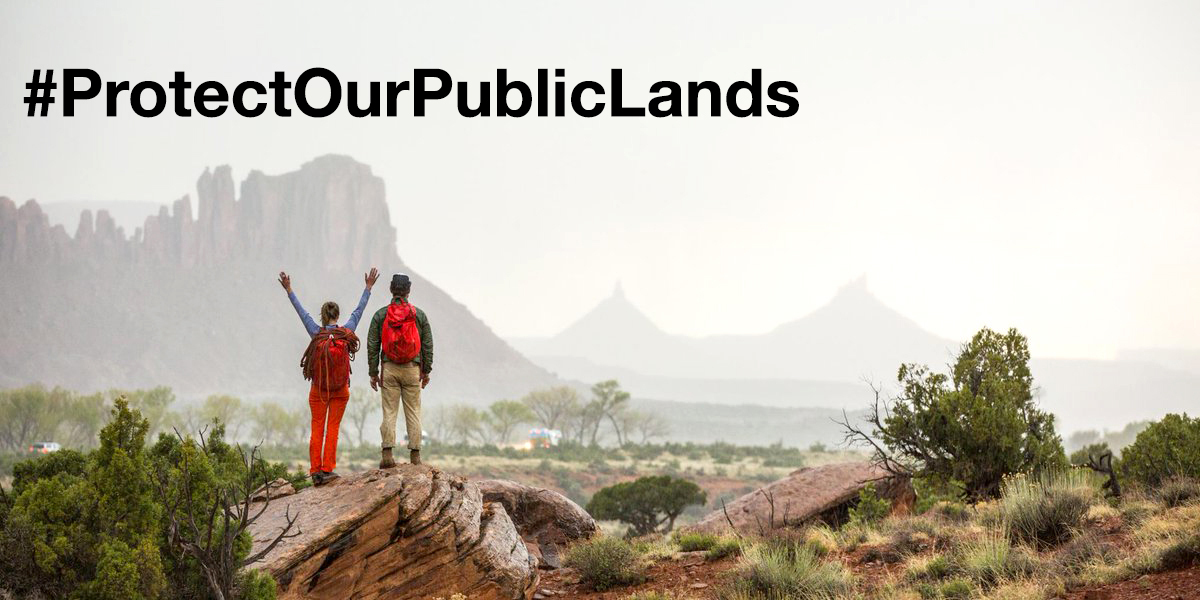

The most anticipated outdoor recreation event of the year just finished in Salt Lake City, Utah, where hundreds of outdoor brands from small business outfitters to industry pioneers like Patagonia and Black Diamond Equipment gathered to witness the cutting-edge in outdoor gear.
OMG! Land Grab Congressman Now Wants #Trump to Abolish National Monuments https://t.co/ZdmAJo7HsN @CenterForBioDiv @sierraclub @Wilderness
— EcoWatch (@EcoWatch) November 27, 2016
Meanwhile, Utah Gov. Gary Herbert and Utah’s congressional delegation led by Congressmen Rob Bishop and Jason Chaffetz and Senators Orrin Hatch and Mike Lee are launching a vicious campaign to dispose of the very public lands that the convention celebrates.
The anti-conservation agenda of these politicians includes: a reversal of the newly appointed Bears Ears National Monument in Utah; stripping the Antiquities Act, an invaluable conservation tool that enables the president to designate national monuments; and selling off our public lands for oil and gas, mining and other development.
Their relentless assault on wildlands is a sharp sting of betrayal that has been felt across the outdoor recreation industry.
This week, outdoor industry leaders have said “enough is enough.”
In an open letter to President-elect Trump and Congress, more than 100 outdoor industry leaders led by REI have called upon elected officials to protect public lands and the integrity of the outdoor recreation industry, which powers $646 billion in gross national product.
The letter, signed by Patagonia among other big-hitters like Osprey, Clif Bar & Company and Chaco states:
It is an American right to roam in our public lands. The people of the United States, today and tomorrow, share equally in the ownership of these majestic places. This powerful idea transcends party lines and sets our country apart from the rest of the world. That is why we strongly oppose any proposal, current or future, that devalues or compromises the integrity of our national public lands.
Yet as the 115th Congress begins, efforts are underway that threaten to undermine over one hundred years of public investment, stewardship and enjoyment of our national public lands. Stated simply, these efforts would be bad for the American people. They include the potential of national public lands being privatized or given to states who might sell them to the highest bidder. This would unravel courageous efforts by leaders from across the political spectrum up to the present day, including Jefferson, Lincoln and Roosevelt.
This is not a red or blue issue. It is an issue that affects our shared freedoms. Public lands should remain in public hands.
This is not a red or blue issue. It is an issue that affects our shared freedoms. Public lands, public hands. #ProtectOurPublicLands
— Patagonia (@patagonia) January 17, 2017
More Outdoor Leaders Speak Out Against the Assault on Our Wild
The outdoor industry letter comes on the heels of a scathing op-ed in the Salt Lake City Tribune from Peter Metcalf, founder and former CEO for Black Diamond Equipment. In that Jan. 10 op-ed, Metcalf demanded that Utah’s political leadership stop its assault on public lands. If they don’t, Outdoor Retailer, which pours $50 million into the state of Utah, should find a new home to host its biannual convention, he wrote. Metcalf relocated Black Diamond to Utah in 1991 for the state’s impressive public lands, but said that Outdoor Retailer should “leave the state in disgust.”
“The Utah delegation has wasted no time in the first days of 2017 to enact their destructive agenda and now the outdoor industry, too, must respond boldly and unified while we are here in Salt Lake,” Metcalf wrote.
A day later, Patagonia’s Yvon Chouinard joined Metcalf by issuing a press release stating:
“Every January and August, Patagonia and hundreds of other companies spend gobs of money to show our latest products at the Outdoor Retailer show. The whole thing is a cash cow for Salt Lake City. You’d think politicians in Utah would bend over backward to make us feel welcome. But instead, Gov. Gary Herbert and his buddies have spent years denigrating our public lands, the backbone of our business and trying to sell them off to the highest bidder. He’s created a hostile environment that puts our industry at risk.”
No doubt that many neighboring western states would be happy to pick up the recreation business that Utah’s politicians are taking for granted.
“New Mexico is open for business,” state Sen. Martin Heinrich tweeted.
These industry leaders are making it rightfully clear that if politicians continue to attack our wildlands, there will be consequences.
The Outdoor Industry Loves Utah … But Does Utah Love the Outdoor Industry? https://t.co/KkikoEpuuv @ecoliving @GoGreenBook
— EcoWatch (@EcoWatch) January 11, 2017
With powerhouse brands like REI, Patagonia and Black Diamond at the helm, members of the outdoor industry are welcome partners in safeguarding Our Wild and are a strong frontline of defense against the growing assault on public lands.
We praise them for taking a stand and encourage other outdoor retailers to join the movement to defend Our Wild from development.
Facts and Figures:
- $12 Billion: Money generated each year, in consumer spending, by outdoor recreation in Utah alone.
- 122,000: Number of jobs generated in the outdoor recreation sector in Utah.
- 91 percent: Percentage of Utah voters who say they do at least one outdoor recreation activity regularly.
- 84 percent: Percentage of Utahns say that living near and enjoying outdoor recreation on public lands is a factor in choosing to live in the West.
- 66 percent: Percentage of voters in Utah who support presidential authority to designate monuments.
- 60 percent: Percentage of Utah voters who view national public lands as belonging more to all Americans than to people in Utah specifically.
Learn more about the Our Wild movement to protect our lands from development.

 233k
233k  41k
41k  Subscribe
Subscribe 